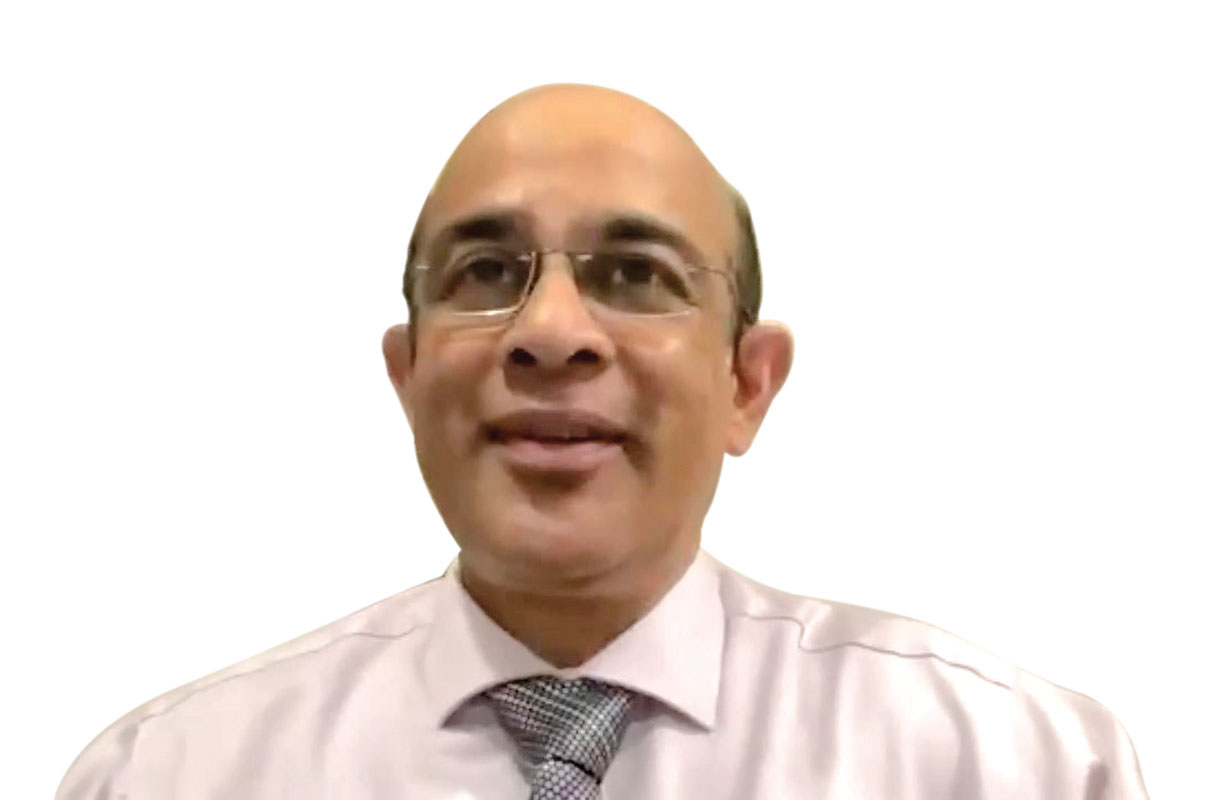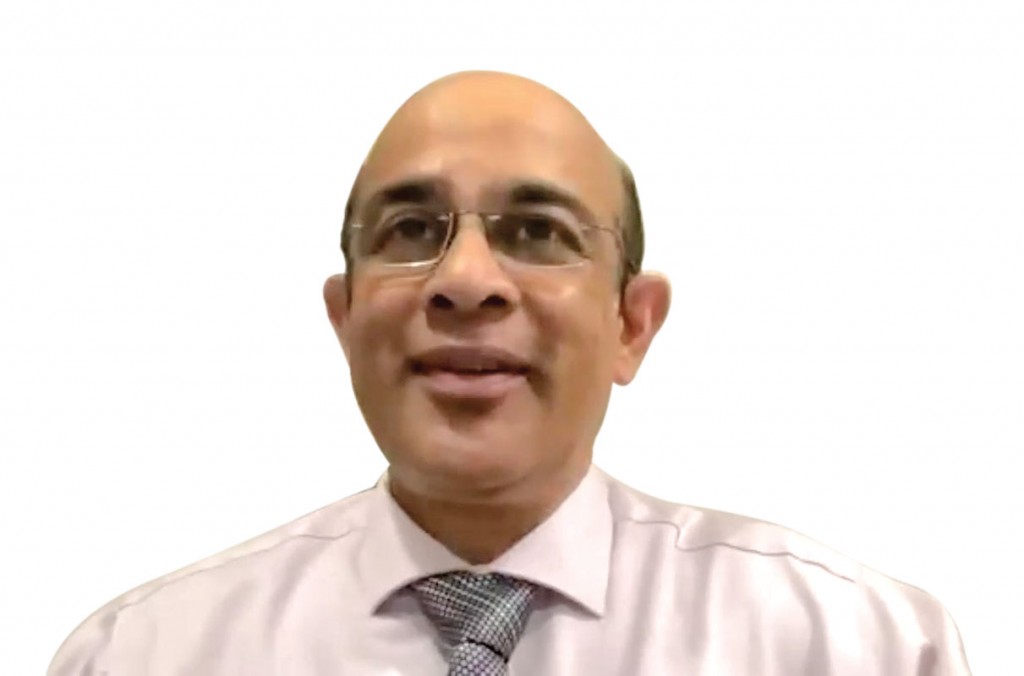
The third wave of Covid has happened with the arrival of the Omicron variant or mutant of the coronavirus. The trying times we live in are well demonstrated by “a Whatsapp message I received. The graph of the food taken in the last two weeks said; bhel puri 10 per cent, sev puri 15 per cent; dosai 20 per cent; curd rice 30 per cent and Dolo 650, 85 per cent,” said infectious diseases specialist Dr V Ramasubramanian, addressing a meeting of the Rotary Club of Madras, RID 3232, of which he is a member.
Giving a brief overview of the corona pandemic, he said that in the last two years, over 300 million people have been infected by this virus and the latest numbers put deaths at over 6 million. “This virus’s ability to keep changing, referred to as frequent mutations, is now known, and Omicron is one such new variant.”
In the healthcare fraternity the major concern was that this variant is able to transmit much more easily than the earlier variant “and has the ability to evade our immune response caused either by the vaccine or by a previous infection. This, it was feared, might make it more virulent or nasty, which, fortunately, has not happened. What has happened is its ability to evade certain treatment modalities.”
The Omicron mutant “transmits so phenomenally that we have compared it to the chickenpox virus which notoriously and easily transmits from one person to another,” said the specialist, who is the medical director of the Capstone Multispecialty Clinic.
Giving a simple example, he said, “If you are in the same room with a person who has chickenpox and you’ve not had it and are susceptible to it, there is a 90 per cent chance you will get it by just staying in that room for 15 minutes.” The Omicron variant was “probably not that bad, but is getting there.” But the positive was that it causes a “very mild disease in most people, and unlike the Delta variant, which caused mortality, or serious and multiple complications in a lot of people, death and serious complications from the Omicron are only a fraction of the Delta variant, which is very reassuring.”
Symptoms
Dr Ramasubramanian said that the symptoms are likely to begin with cold-like symptoms… sneezing, a scratchy throat and progression to body pain and fever. But the earlier symptoms of the coronavirus — diarrhoea, loss of taste and smell, are less common. The commonest complaints are cold and sore throat… some complain of severe throat pain which requires more than a paracetamol.
A positive is that the Omicron mutant causes a very mild disease in most people, unlike the Delta variant, which causes mortality, and serious complications in many people.
Another difference is that while earlier children were totally spared, “now we are seeing even very young children coming down with fever — 101 or 102 deg C; but fortunately it lasts only for 1–2 days, and they recover. So the good news is that if you feel much better on day 4 or 5, it is most probably Omicron and you just need to isolate for 4–5 days more.”
On treatment, he said the monoclonal antibody cocktail, sometimes referred to as Trumps medicine, has no role to play if one has Omicron. But steroids still work, and are indicated for the elderly who have several comorbidities, develop viral pneumonia and have oxygen saturation below 95 per cent. “Then steroids are indicated and they work.”
Role of vaccination
“We have seen that vaccine-induced immunity wanes slowly after three months and the levels of antibodies start coming down. We still don’t know what is the protective level of antibodies, so this means we are going by intuitive logic, saying that if these levels go down, a booster is needed… call it a booster or third dose of vaccine. The third dose is beneficial if you are over 60 or have a condition that impairs your immune response.”
Clearing doubts on how long one with the Omicron infection should isolate, the expert said different countries give different deadlines; while the US says five days of isolation after testing positive, and five more days with a compulsory mask if you go out, the UK, Japan and France mandate 10 days’ isolation. The WHO recommends 14 days and the Indian government 7 days of isolation after the test result is positive.
Action after symptoms
Addressing concerns on what one should do if symptoms such as body pain, sore throat, fever and a running nose appear, he said, “First of all isolate, and don’t panic. If you are young, and vaccinated, isolate for 7 days and then go out. But if you want to confirm what it is and don’t want to wait for seven days, then do the RT-PCR test after two or three days and then remove isolation after another 5 days. If you test positive please don’t panic… I get messages after 9 pm saying I’ve tested positive, what do I do. Relax at home, there is no need to panic, nothing happens immediately or overnight. Stay away from elders; the treatment is purely supportive with paracetamol and anti-histamines for a cold and maybe a cough-suppressing syrup. I don’t think even vitamins are required but we always give vitamins because it makes the patient feel better. Fortunately, with Omicron, within 4–5 days people do well. But if your cough and fever persist and you are getting worse, do see a doctor again after the 4th or 5th day to check if all is well.”
Answering a question on whether one who has tested Covid-positive should do a test after 11–12 days, or else his name would continue to remain on the positive list, Dr Ramasubramanian said, “No, you don’t need to repeat the test; remember that even after 10 days the rapid antigen test will detect the antigen. It may be dead virus which the RT-PCR test will detect.” The test is so sensitive that “you may test positive even for 10–12 weeks. So please don’t repeat the test.”
For those, he added, who want to return to the US or UK after a 15–20 days vacation, have tested positive and have to return, several flight authorities accept letters from doctors certifying that the passenger has isolated for the required period, is fit and safe to board a flight.
Doctor’s dilemma
Asked about the biggest challenge doctors like him face during this pandemic, he said it was the overload of information; “there is so much of information out there that most people seem to know more than doctors.” Only the previous week he had a patient’s attender coming to him with a box of medicines, saying, ‘do I give this tablet to him now or will you give after 10 minutes?’ Armed with all kinds of information people come to their own conclusions so it is difficult to practise as a doctor. So unless you are absolutely confident about your decision, this information overload is difficult to handle.
Useful indicators
- After Omicron, wait for at least 2–3 months for a booster shot of vaccine, because the infection itself is like a vaccine. After 3 months the antibodies level falls, so booster can be taken.
- Don’t take vaccine when you have fever; wait for a day or two. Taking a shot when you have an ordinary cold is fine, as long as you know it is not Covid-related.
- Differentiating between variants — such as Delta or Omicron is not possible because the RT-PCR doesn’t tell you so specifically, and genome sequencing is not done commercially. But symptoms and hints such as high fever in children are likely to be caused by the Omicron variant. Fever lasting beyond 5–6 days and loss of taste and smell is likely to be Delta. Bottomline: you cannot differentiate categorically.
- Just because Omicron creates mild disease, parties/gatherings akin to the chickenpox parties of yore, when children were put together in a room with an infected child so that all of them could get the infection and get immunity, are strictly not advised. This is because chickenpox caused a very mild infection in children. Whereas in some people with serious comorbidities Omicron can cause serious damage.
- Treatment for elderly people who test positive. For those at a high risk of running into complications that might require hospitalisation — people over 60 with multiple comorbidities, people whose immune system is compromised through a renal transplant or patients with immune system diseases — and the doctor knowing that it is the Delta variant, the monoclonal cocktail can be given early. For such patients a 3-day course of Remdesivir is also advisable.
- A useful mantra — after testing positive, isolate, take a nutritious diet and stay positive. A positive mindset causes a strong immune system, and helps get rid of the infection.
- Risk for the unvaccinated is reasonably high. Vaccines can not only prevent hospitalisation but also minimise transmission because a vaccinated person has a smaller viral load in her throat compared to an unvaccinated person, so the chances of her spreading the infection is much lower.
- Surface contact transmission is no longer believed to be a threat in spreading the infection as thought in the early days of the pandemic. We now know it is either spread by droplets, or in a closed unventilated room it can be airborne and spread further than six feet. The chance of surfaces being touched and carrying the disease is almost negligible. But keep washing your hands!
- Bizarre cases of a person testing negative a few hours before boarding a long flight and positive after landing are medically possible, and there is no “cheating” involved as some viral video messages claim. Most likely the traveller had already picked up the virus and it could have been incubating in his body when the first test was taken, and manifested itself only after he landed.
- No test is 100 per cent sensitive or specific. Doctors have seen in the same family the spouse being asymptomatic and testing positive, whereas the husband has symptoms but tests negative. The RT-PCR test is 99 per cent specific but it can, at best, pick up only 70 per cent of the infections. The result depends on the way the sample is taken, where the scraping is done, how the process is conducted. So if it’s a positive result, it is positive, but sometimes a false negative is possible.
- Travel; countries such as the UK and Singapore have decided that if a person is vaccinated and has good immunity, pre-travel and post-travel checks are not required. I think in the next few months or a year or two, we will have to just move on.
- Genome sequencing is not yet commercial. A new test from Tata Diagnostics is coming. Termed Omnisure, it will identify only in a few hours whether it is Delta or Omicron. It looks interesting.






